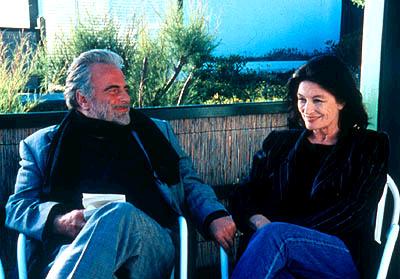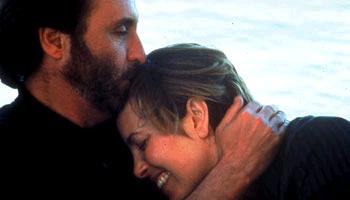

In Festival in Cannes, writer/director Henry Jaglom has two purposes; to write a light romantic comedy satirizing the superficiality of the film industry, and to write a serious film about the important issue of ageism against female actors in movies. Combining the two lessens the effect of his latter message, but this by no means that Festival in Cannes is not worth watching. Overall, it's a breezy little cute film that stops sometimes for moments of serious introspection, with two characters, Kaz and Millie Marquand embodying Jaglom's (Deja Vu, Last Summer in the Hamptons) dual themes.
Everything begins with Alice Palmer (Greta Scacchi, Cotton Mary, One of the Hollywood Ten), an actress with a script looking for financing on her directorial debut. It's a film with a strong lead for an older woman, and Alice has Gena Rowlands in mind. Kaz (Zack Norman, Get a Job, Crosscut) is a slick, fast-talking producer who agrees to help her seek a star. He wants Marquand (Anouk Aimee, The Blue Island, 2000 Eve), and older French actress, to star. Marquand loves the script and the role because it allows her to flex her acting muscles. However, Rick Yorkin (Ron Silver, Ali, Cutaway), another producer, is seeking her. Yorkin is financing the next Tom Hanks film, a ninety-million dollar potential blockbuster. Hanks will star only if another French actress will play opposite him, who will only do the film is Marquand plays her mother. This presents the central dilemma for Marquand; will she play a small, easy, stereotypical role in a film she cares little about, or a challenging one in a small film?
Also on hand for the madness is Victor Kovner (Maximillian Schnell, I Love You, Baby, The Song of the Lark), Marquand's ex-husband, and Blue (Jenny Gabrielle), the latest "it" girl at the festival. Kovner lost much of Marquand's money through bad investments, but the two are still good friends. The two main storylines emerge after the basic introductions. Millie must decide how to further her career, while Kaz and Yorkin jockey for her attention. Two other minor stories appear briefly; Alice's own struggle for compromise and Blue's desire for privacy. Alice has her own set vision of what she wants her film to be, yet Kaz and others want story changes, supposedly to make the film more successful. Blue is not sure she wants all the attention that being a major movie star will bring her. These are fascinating subplots that Jaglom does not expound upon, yet their inclusion adds a little more depth to the story.
As good as Aimee is, Norman steals every scene away from her. He is the ultimate salesman, switching sides to suit his needs. His sycophantic performance is the most amusing aspect of Festival in Cannes. His only ambition is to make money, and he will do or say anything to get people to believe him. Big film festivals like Cannes and Sundance tend to be shopping malls for film distribution rights, and the Kaz character is a great (if exaggerated) stereotype. His over-the-top performance overshadows Aimee's, which is much more subdued and internal. She is not being fickle, but is genuinely concerned about her decision. This brings Yorkin to his knees. He feels dumbfounded at having to go to Alice for help. After all, he is a successful producer financing a ninety-million dollar picture with Tom Hanks, and Alice is an untested director with a piddly three-million dollar film. There's not as much substance in Festival in Cannes as Jaglom probably thinks there is, but it still amusin to watch.